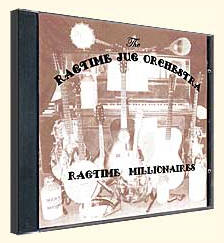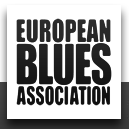
Painting © 2004 Loz
Arkle
Website
© Copyright 2000-2011 Alan White - All
Rights Reserved
Site optimised for Microsoft Internet Explorer
Early Blues Interview
|
|
"The RJO is the authentic string-band sound of the early 20th century, playing a rootsy good-time mix of ragtime, country blues, hokum, skiffle and jug band music.
On a
plethora of acoustic instrumentation The RJO bring you the music of:
"authentic...absorbing."
"The RJO
added a lovely old-time feel ... and the audience joined in
enthusiastically."
I had the pleasure of talking with John Anderson, latterly joined by Alan Draisey, over a jar during their virtuoso performance as The Ragtime Jug Orchestra at the Upton Blues Festival. Alan: Thank for agreeing to do the interview John. What are your first musical memories growing up in deepest Gloucestershire? John: Iím a Londoner actually. I donít know how I got into blues. My father was into swing Ė Django Rheinhardt and stuff like that and the first records I bought when I got one of those gramophones that look like suitcases were Little Red Rooster and the Golden Guinea Chess Greats. But before that I remember buying rock and roll and lots of things off juke boxes because they were cheap. My friend had an older brother so we got into things earlier. Alan: Did you always want to become a musician? John: ďMusicianĒ sounds very grand! Itís not my real job. Yes, I think so, Iíve always played since I got my first guitar at 13, I had a jug band when I was at college, I supported the Groundhogs at one point. Once! And then for years I just taught guitar in schools and then I met Alan Draisey about 10 or 12 years ago and weíve been playing ever since. Weíve been doing The Ragtime Jug Orchestra for about three years now. Alan: What first attracted you to the good time string band music? John: Well, itís quite cheery really. I donít know really. One of the first LPs I ever bought was the Memphis Jug Band and one of the first performers I remember seeing was Johnny Joyce who had a 12 string and itís why Iíve always had a 12 string. I went to folk clubs but I was into all sorts of things and itís part of the shared tradition; it fits nicely between heavy blues, Chicago electric and old timey. Alan: Who do you think has influence you most in your music? John: In playing this sort of material? Memphis Jug Band, Gus Cannon, Bo Carter, Ragtime Henry Thomas Ė they would be my ones that I like because I like two step rhythm rather than shuffles.
Alan: Tell me about all the instruments you play? John: The 12 string Iíve got with me Iíve had since 1968, itís a piece of plywood that somebody must have made and a friendís wife lent it to me but Iíve still got it. My proper 12 string is a 1926 Stella which was one of Paul Jeremiahís guitars that I bought about three years ago. I got a National Trojan which is my resonator which is 1934 wooden bodied resonator which Iíve only had for about three years; and Iíve got a replica L-OO Gibson which is about 10 or 12 years old. Iíve got older guitars and banjos at home and I like rescuing forlorn strange instruments from junk shops, like triangular dulcimers and a metal banjoy thing which I brought back from Turkey which I like. So Iíve got a lot of instruments which I donít play but theyíre on the wall at home. And the jug obviously. And the kazoo. You havenít seen the large kazoo yet Ėitís 8 inches! Alan: Which of these is your favourite, which do you enjoy playing the most? John: All the guitars are different and it depends what you feel like really. Iíve persevered with old time banjo but Iím really a guitarist. Alan: Are there any particular songs you play which have special meaning to you? John: That does vary. There are some that Iím particularly fond of, like Willie McTellís Wake Up Momma. I like a lot of the Bo Carter. Alan: We followed Michael Grayís promotional tour of his Willie McTell book in the US last year Ė excellent book. John: Yes, Iíve read that. I did some graves in Mississippi and John Hurtís was the best Alan: Did you find it? We got half way down a deserted muddy track and didnít dare take the car further and there was nowhere to park it. John: I abandoned the car and had to walk for about half a mile and then I met a man who thought I was very strange. The whole cemetery is in the woods but itís a new gravestone and itís full of guitar picks. Alan: Tell me about the making of your smash hits album, 'Ragtime Millionaire'. John: Well, thereís another one in process, which has been in process for a very long time. We plucked up the courage to go to a studio but we wouldnít do it like that again because we put everything down separately and next time weíd put it all down at once. Itís hard to get the oomph in it if you do it separately. Alan: So when does the new album hit the streets? John: Probably the beginning of next year. Alan: And does it have a working title? John: 'Your Biscuits are Big Enough For Me' or something like that. Alan: Thatís catchy!
John: Oh yes, very soon. Itís a cook book that will be essential if you want to be a kitchen man and help ladies keep their ranges clean. Itís got about 100 recipes, from h'ordearve such as Squirrel Tails down to desserts, and it will have pictures that I took in Mississippi and various places. Itís just simmering and in the pipeline so if you want to keep it clean, you should write that! Alan: Tell me about the Blue Front Blues Room in the Severn Wye Delta. John: Oh yes! Alan and I and another chap called Pete have run this for about 9 years, with around 150 gigs, all acoustic, mainly blues but we branch out into old timey, so weíve had quite a lot of people there Ė Lazy Lester, Jerry Ricks, Big Bill Morganfield, John Renbourn, Wizz Jones, Bob Brozman, Woody Mann, Spikedrivers, Dave Kelly. Blues and a bit more, weíve had some gypsy jazz and some old timey and we had blue grass once. We used to run it twice a month at one point but we decided that was like having a real job so we run about 8 a year now. We start in September 2010 with Bob Hall Bluebird Blues then weíve got Bob Broznan, Wizz Jones, The Toyhearts, Mike Sanchez and then weíve got some youngsters for a couple of months and then possibly Groundhogs. So itís not terribly bluesy this year but weíve got a big following and a good website! Alan: You also run Blue Front Blues on the Forest of Dean radio. Tell me about that one. John: Sadly, no more. The community Radio grant disappeared but we did it for 9 years. Alan: Tell me about your involvement with the European Blues Association. John: At the moment Iím the secretary of the European Blues Association which is an organisation which was a charity set up in 1999 to promote all forms of African American music. It has a huge archive based around Paul Oliverís collection. Paul Oliver is a trustee and there is a centre in Gloucester in the main public library, open Thursday, Friday, and Saturday. We have monthly acoustic jams, Michael Roach, the development director, is starting a black music study group in September 2010, we have tuition workshops, lectures and we have free concerts in the library to tie in with Gloucester Blues Festival. You should look at the website www.euroblues.org. Thereís a lot happening, for example a man in his 80s came in yesterday and wants us to have his entire jazz collection. Heís managed to get interviews off the radio on mini-disc from Frances Smith, the piano blues player. So itís all forms of music from blues, spirituals, ragtime, jazz. It happens to be called the Blues Association but the real thing is that itís archives of African American music. It also does tuition events. There's acoustic weekends at The Atrix, Bromsgrove and Pocklington Arts Centre, York in November, and there's also BluesWeek tuition at the University of Northampton in August, including talks by Paul Oliver. We are getting more and more members, so the more people that join the better so that it survives. Alan: Tell me about your collection of sheet music you've donated - I believe it's a big collection. John: Ebay! Ebay! I had a lot of British sheet music that my Dad had collected, he was really into 30s swing and was a publicist for big bands in the late 30s, during the war as well. I asked my mother once, ďDid you meet all these people?Ē and she said ďOoh, I donít know. I think so but I canít really rememberĒ. She was much more into light opera. I asked Paul Oliver about sheet music in the archive and he said there was only a couple. Iím now a lot poorer thanks to Ebay but I now have about a thousand from 1820s to 1920s. Mamie Smithís Crazy Blues is my cut-off point. There were 400 odd blues published before Crazy Blues so Iíve got quite a few of those, and early minstrel stuff and things like that. At some point it will be digitized and online.
Alan: How do you see the future of the blues? Alan Draisey: It needs to get out of itís box somehow. In Britain blues seems to be trapped in the 1960s and it needs to think outside that a bit. John: Because we do workshops for children we get to go to folk festivals and they managed to do it in the 1990s. They managed to get out of the men with tankards and itís now full of young people. Alan Draisey: Folk has diversified. All the ďfolkĒ music now is actually world music. John: And blues needs to do that because thatís what young people expect. Iíve got issues with the mish-mash of brown mess but if it doesnít do that itíll die out and itíll end up with six men with ponytails going to heavy blues rock. Alan Draisey: Folk has diversified but blues has got more and more blinkered.
Alan: John and Alan, thank you very much for your time. Ragtime Jug Orchestra at the Gloucester Blues Festival 2010 ....
The European Blues Association The European Blues Association (EBA) is a registered charity, formed in 1999 to become the focus of blues activity and research for African American music in Europe. The Archive of African American Music can be visited at the EBA headquarters in Gloucester and at the University of Gloucestershire. The EBA organises a range of workshops, Blues Weekends and the annual Blues Week residential tuition programme for harmonica, fingerstyle and slide guitar, keyboard and vocals. Check out photos of The Ragtime Jug Orchestra at Colne R&B Festival 2010
Return to
Blues Interviews List |









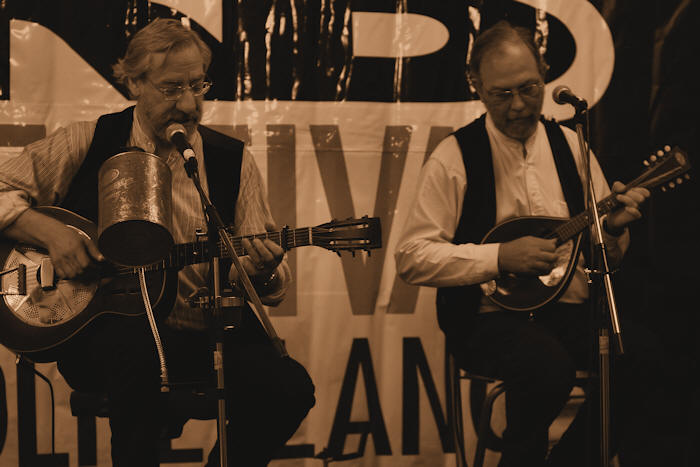
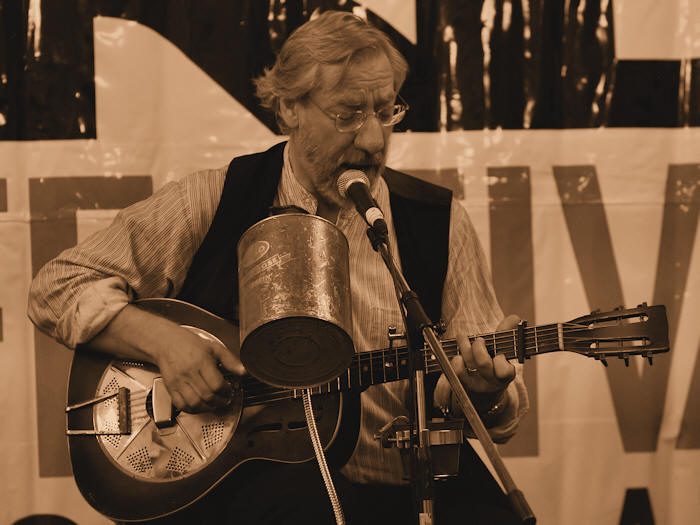
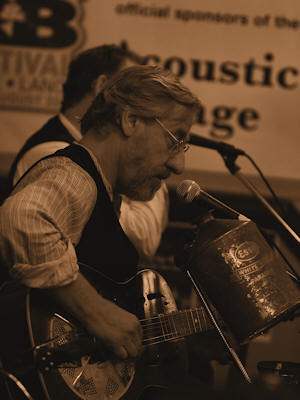 Alan:
Now I believe you are both kitchen men and have the Ragtime Jug Cook
Book soon to be published. Tell me more.
Alan:
Now I believe you are both kitchen men and have the Ragtime Jug Cook
Book soon to be published. Tell me more.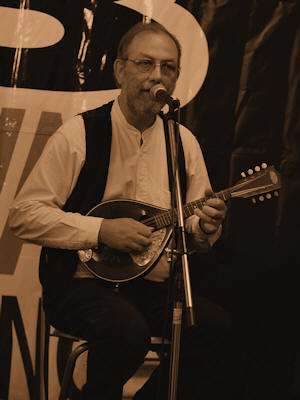 [Alan
Draisey joined us at this point - he had heard the chinking of glass and
the quaffing of fine Worcestershire ale]
[Alan
Draisey joined us at this point - he had heard the chinking of glass and
the quaffing of fine Worcestershire ale]